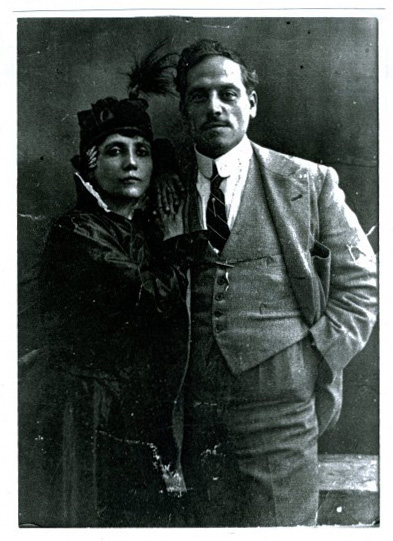
- Industry
Elvira Notari, Pioneer of Italian Cinema
Elvira Coda Notari, the first woman director of Italian cinema, was born in Salerno, Campania, on February 10, 1875. She benefited from an education, which was unusual for women of that time, earning a high school degree which allowed her to work as an elementary school teacher. After moving to Naples with her family, she met photographer Nicola Notari, whom she married in 1902. In 1906, they started a company together, Dora Film after their daughter, which specialized in the colorization of movies, short films called “Arrivederci,” newsreels, and narrative features. Notari wrote the screenplays, directed, edited, and sometimes acted. Her husband was in charge of the cinematography, lighting, and set design; their son Eduardo, nicknamed Gennariello, played important roles in all of his mother’s films.
Notari also founded a school of cinematic art where she taught naturalistic acting, in contrast with the theatrical style of famous actresses of the period like Francesca Bertini in Assunta Spina (1915) and Lyda Borelli in Ma l’amor mio non muore (1913).
Her movies were based on popular Neapolitan songs, plays, and serial novels, and told stories of love and jealousy, betrayal and murder, often ripped from the headlines. The projection of silent films was customarily accompanied by live music from a piano player or a small orchestra. In a 1979 video interview, Eduardo Notari remarked: “We were the first to put a singer under the screen synchronized with the images.” In the same style as other silents of the era, the interior scenes were usually tinted in sepia, the exteriors in blue; additionally, all of the Dora films were colorized by hand, frame by frame.
Most of the 60 feature films directed by Notari are lost, except for three that were presented in 2014 at the Film Festival “Laceno d’oro” in Avellino, Campania, and in 2016 at PAN, the Arts Palace in Naples. To accompany this exhibit of movies, photographs and documents, titled “La film di Elvira,” a book was published in 2016 with several essays, including one penned by Sara Fiori, outlining the parallels between the Italian Elvira Coda Notari and the French Alice Guy-Blaché, the first woman filmmaker in the history of cinema.
These three films were then presented at the 2018 Bologna film festival “Il Cinema Ritrovato” in a section titled “Napoli che canta” (Naples sings).
Fantasia ‘e surdato (Fantasy of the Soldier, 1927), based on a Neapolitan ballad, features a grown-up Eduardo as Gennariello, a young man who, after being unjustly jailed for murdering his brother, volunteers for the front. Soldiers from Naples, Palermo, Venice and Florence sing songs from their hometowns, accompanied by images of the most famous landmarks, in the case of Naples, the Gulf and Vesuvius. At 28 minutes, only half of the original footage survived because the rest was cut by the censors.
‘A santanotte (The Holy Night, 1922), restored in 2008 by George Eastman House and Cineteca Nazionale, tells the story of Nanninella (Rosè Angione), a young girl who works as a waitress whose drunken father beats her. She is forced to marry an unwelcome suitor, while the man she loves languishes in jail, falsely accused of murder.
È piccerella (She’s a Young Girl, 1921) also stars Rosè Angione as Margaretella. Rosella was Eduardo’s math teacher, recruited by his mother to become an actress. Film critic Enza Troianelli writes that Margaretella is not a femme fatale: “She knows that in the South of Italy if a girl gets engaged, she risks domestic imprisonment within the four walls of the home.” Her wish for freedom “becomes an anthem to joyous femininity.” However, “She is condemned by conformism and respectability” and meets a tragic end. It is to be noted that, according to Fiori, piccerella in the Neapolitan dialect means a willful, sincere and transgressive young woman.
Another main character in both films is Maria, the mother, played by Elisa Cava, a saintly woman devoted to her sons, clearly representing the director’s own feelings about motherhood.
In È piccerella documentary footage of real-life events is mixed with fictionalized scenes. It’s amazing to watch the daily life of Naples — well-dressed citizens in horse-drawn carriages returning from an annual pilgrimage, eating out in restaurants, attending the celebrations of Our Lady of Mount Carmel — complete with fireworks.
In 1925, Dora Film opened a New York Office on Mulberry Street in Little Italy where nostalgic Italian immigrants longed to see movies set in their beloved Naples.
Naples had been one of the two centers of Italian movie production since 1896, when on April 4, the short films by the Lumière Brothers premiered at the café-chantant Salone Margherita. Turin was the other city where early films were produced, but they were generally big-budget historical spectacles like Cabiria (1914) by Giovanni Pastrone.
By 1930, Italian movie production had moved to Rome, supported by Mussolini’s fascist government that ruled Italy from 1922, and often censored Notari’s films for depicting a reality of Neapolitan life that conflicted with the propaganda of ancient Roman Empire glory promoted by the regime. Also because of the arrival of sound, Dora Film stopped production, only handling distribution. Notari retired in Cava de’ Tirreni, her father’s hometown, where she died on December 17, 1946. She lived long enough to see Italian women earn the right to vote in national elections, which was granted on February 1, 1945.
Ignored by male film critics and historians for decades, Notari was studied in depth by Troianelli in the 1989 biography “Elvira Notari pioniera del cinema napoletano (1875-1946),” by Italian-American scholar Giuliana Bruno in “Rovine con vista. Alla ricerca del cinema perduto di Elvira Notari” published in 1995, and by Chiara Ricci in “Il cinema in penombra di Elvira Notari” published in 2016. Finally, this champion of heroic women who defied patriarchal society, a wife and mother, an entrepreneur and an artist, had received her much-deserved recognition.

